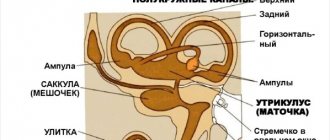Causes of the problem
“There are a number of major nerve clusters that connect your brain to different parts of your face and head. When nerves are inflamed, compressed, or damaged, numbness can occur. Reduced or blocked blood supply can also cause numbness,” says Irina Ryabokon.
The reasons why numbness of the head may develop, says the neurologist, are varied. So, for example, if such a symptom appeared due to a cold, headaches or because of an uncomfortable sleeping position, then there is no need to worry. But if a person suffers from some illness, takes a number of medications, or has suffered an injury, you need to be wary. Head injuries or concussions can cause numbness if nerves are damaged.
“By the word “numbness,” which actually means loss of sensitivity, patients often understand various sensations, such as crawling, burning, tingling (so-called paresthesia). To find out the cause of such sensations, it is extremely important to determine what exactly is meant - a decrease, lack of sensitivity or paresthesia,” explains Ryabokon.
Sclerosis, but not that one. By what signs are multiple pathologies recognized? Read more
The neurologist notes that with paresthesia, sensitivity can be preserved, sometimes even enhanced. Less common are situations where paresthesia is combined with a violation of sensitivity in this area (sense of touch, pain sensitivity - injection, feeling of vibration, etc.).
“Paresthesia (without loss of sensitivity) can have numerous causes, and the cause cannot always be determined. For example, they may be side effects of certain medications or associated with severe anxiety or anxiety. Especially when the localization of sensations changes,” notes the neurologist.
But impaired sensitivity in a certain area of the head or face requires a detailed examination. “The cause may be vascular disorders, nerve damage, or brain diseases. The unilateral and persistent nature of the disorders requires seeing a doctor and a detailed examination,” she says.
Quite serious illnesses can also cause this symptom. “Diabetic neuropathy can cause permanent nerve damage. Numbness is also a common symptom of multiple sclerosis, a chronic condition that affects the central nervous system,” says the specialist.
In addition, in the list of what numbness in the head may indicate, the following items:
- allergic rhinitis;
- cold;
- sinusitis;
- brain tumor;
- arterial hypertension;
- stroke;
- epilepsy attacks;
- use of prohibited substances;
- alcohol abuse;
- taking anticonvulsants.
“You should see a doctor immediately if head numbness occurs after starting medication,” says the neurologist. The specialist also notes that the list of reasons for the feeling of numbness in the head can be supplemented with headaches and cluster pains (severe pain syndrome), tension pain, migraines, encephalitis, Lyme disease, shingles, as well as dental infections.
“Numbness in the head sometimes occurs only on one side. Or only the temple or back of the head may suffer. Typically, such conditions signal the following diseases: Bell's palsy, infections, acute migraine,” the doctor notes.
My head hurts! When to take your child to a neurologist Read more
Multiple sclerosis
Description
The disease is chronic.
The pathology is expressed in the gradual replacement of nervous tissue cells with connective tissue cells. Nature and localization of pain
During moments of exacerbation, pain appears in the occipital part, as well as in the places of greatest progression of the disease.
The pain is characterized by a compressive effect, turning into an “aching” state.
Additional symptoms
- Visual impairment in one or both eyes.
- Some numbness of the fingers, decreased sensitivity.
- Decreased muscle tone.
- There is a loss of coordination.
Which doctor should I see?
The specialized doctor who deals with this brain problem is
a neurologist
.
The doctor will carry out the required diagnostic measures and give the necessary recommendations to prevent the progression of the disease. Diagnostics
The professional approach of the doctor when examining the patient is important.
Based on the initial examination, the specialist may prescribe magnetic resonance imaging.
Treatment
At times of exacerbation of the disease, drugs such as Cortisone are used, which helps reduce inflammatory processes.
In the period between attacks, based on the degree of neglect of the disease, the doctor may prescribe the following medications:
- "Cyclosporin A."
- "Methotrexate."
- "Azathioprine."
Physiological state
“Often a feeling of numbness in the head occurs during sleep. When you wake up with a numb head, it may be a sign that you are sleeping in a position that restricts blood flow to your head,” notes the neurologist. Here you can try to cope with the problem of sleep correction. “In this case, try sleeping on your back or side, placing your head and neck in a position that will not cause discomfort. If you are lying on your side, try putting a pillow between your knees, this will help straighten your back,” advises Irina Ryabokon.
Traumatic brain injuries
Description of the problem
Traumatic brain injuries
are the most common causes
of headaches and numbness.
This pathology is a consequence of various emergency situations at work, car accidents, sports tournaments, etc.
Nature of pain
The source of pain is concentrated at the site of injury.
Depending on the extent of the injury, the pain may spread throughout the entire head. The painful sensation has a pulsating effect. Associated symptoms
- Nausea.
- Dizziness.
- Vomiting reflex.
- Darkening in the eyes (first minutes after injury).
Which doctor will help?
In this case,
you should contact either a surgeon
, a traumatologist, or a neurologist if the injury affects the brain.
Diagnostic methods
The doctor must examine the victim, establishing the degree of injury received, assess its danger and development.
After this, the patient is sent to the fluorography room to obtain a head image to accurately determine the location of the injury.
Treatment
The course of treatment is to eliminate the pain syndrome. For this, the patient is prescribed painkillers: “Sedalgin Plus”, “Citramon”, “Analgin”. In addition, the patient is recommended to drink rosehip tea with sugar.
How can a neurologist help?
If you have such a symptom and exclude physiological reasons for its development, you should visit a specialist. You should contact a neurologist. He will examine you and ask about your symptoms and medical history. He may also order one or more of the following tests to help determine the cause of the numbness in the head: blood tests, nerve conduction studies and electromyography, MRI, CT scan, nerve biopsy.
Since quite a few conditions cause numbness in the head, it may take some time to determine what exactly is causing the characteristic symptoms. You should not leave the situation unattended, because you can waste time, and then you will have to undergo treatment longer and more difficult.
There are contraindications. Be sure to consult your doctor.
Back and neck injuries
Description
Injury to the spine is another possible cause of head pain.
In this sense, we should not forget about osteochondrosis. The pathology is manifested by inflammatory processes in the joints of the spine, especially in the neck area. How and where pain manifests itself
In osteochondrosis, pain is clearly felt in the occipital region.
In this case, the patient feels some compression.
Associated symptoms
- There may be numbness in the neck and back of the head when moments of particular inflammation occur in the spinal discs.
- Periodic dizziness.
- The pain can “radiate” into the arm, while limiting its movement.
- False sensations of a sick heart may occur (pressure effect).
Which doctor will help?
If you have osteochondrosis, you should see a rheumatologist.
In case of injuries to the spine, it is advisable to make an appointment with a traumatologist or surgeon. Diagnostic studies
To find out the exact location of the inflammatory process,
it is recommended to undergo an MRI
.
This is the most modern diagnostic method.
Treatment
Experts recommend comprehensive treatment of osteochondrosis. To relieve painful sensations, special medications are prescribed that relieve not only pain, but also inflammation. At the initial stage, when severe “shooting” pain with numbness of the limb is possible, it is advisable to add antispasmodics to the course.
What examinations are required
Before making a diagnosis, any doctor prescribes a series of tests and undergoes the necessary examinations.
- Blood test (general, biochemical, hormones, infections, toxic substances). The blood is tested to find out whether there is a harmful agent in the blood or not, whether all substances and cells are in sufficient quantity, or whether something is missing. Along with a blood test, your doctor may prescribe a urine test to get a more complete picture of how your body is functioning.
- Doppler ultrasound (ultrasound examination of neck vessels). If the scalp becomes numb, the doctor may suspect problems with the patency of the blood vessels in the neck. Ultrasound examination helps to visually trace the passage of blood flow (speed, direction) and record obstacles in the vessels (atherosclerotic plaques, blood clots, abnormal bends).
- CT scan of the head. Computed tomography collects information about the state of the brain by taking layer-by-layer images. This way you can see injuries, foreign bodies, inflammation of the membranes of the brain, hemorrhages and tumors.
- MRI of the brain. Magnetic resonance imaging creates a three-dimensional image of organs. All details of organs and tissues are visible in 3 dimensions.
- X-ray of the skull. If there is a symptom of numbness, the doctor may prescribe an x-ray as a diagnosis to identify or exclude pathology from the bones, sinuses, and base of the skull. In X-ray images you can see the soft tissues of the brain and obvious changes in them.
- Angiography of the brain. The procedure is performed with intravenous administration of a radiocontrast agent. It improves the visualization of blood vessels. You can determine their shape, volume and rate of filling with blood, and the tortuosity of the vascular pattern of the brain.
↑
Why does the tip of the nose go numb?
It is not often that we notice a loss of sensitivity at the tip of the nose.
To detect the affected area, just touch it or move the part. Numbness of the nose is manifested by a lack of sensation when palpating it. The causes of nasal numbness may be physiological or indicate the development of a disease. The content of the article
Among the common causes, it is worth highlighting disturbances in vascular blood flow, changes in blood pressure, as well as psycho-emotional instability.
If the tip of the nose becomes very numb and sensitivity in other parts of the face and body is lost, you should call an ambulance. The cause of the deterioration may be a stroke.
Treatment methods for loss of sensation in the head
The scope of treatment for loss of sensation in the head completely depends on the disease. For example, for the most common disease – osteochondrosis, the following is prescribed:
- painkillers from the group of non-steroidal anti-inflammatory drugs: Diclofenac, Ketonal, Ibuprofen;
- relaxing muscles: Mydocalm, Sirdalud;
- decongestants: Hypothiazide, Lasix;
- stimulating metabolic processes: Rumalon, Actovegin;
- improving nerve functions: Milgamma, Berlition;
- facilitating venous outflow: Troxevasin, Aescusan;
- normalizing microcirculation (Trental, Xanthinol nicotinate);
- activating the transmission of nerve impulses: Neuromidin.
The required group of drugs is selected based on the prevailing symptoms. In addition to medications, it is recommended to wear a Shants collar to relieve the load on the spine. Physiotherapy helps well - in the acute stage, UHF, the introduction of Hydrocortisone with ultrasound, acupuncture, and during the recovery period massage and physical therapy are indicated.
A similar approach is used in the treatment of neuritis and neuralgia. If there is a tumor process, a herniated disc, or spinal instability, surgery is needed. It is also recommended if the full course of drug therapy is ineffective.
If the cause of numbness is cerebral vascular disease, then the following drugs are used:
- cholesterol-lowering drugs (Vasilip, Roxera);
- calcium channel blockers (Corinfar, Nimotop);
- improving cerebral blood flow (Pentilin, Bilobil);
- reducing blood viscosity (Curantil, Aspirin);
- protecting against lack of oxygen (Nootropil, Ceraxon);
- B vitamins (Neurobion, Milgamma).
Cerebral circulatory disorders
Description of the problem
The vertebral artery supplies blood to the brain.
Disruption of the artery leads to a malfunction of the brain
.
Compression can occur for two reasons: a physiological modification of the processes of the vertebral discs, a decrease in the passage of the artery.
Nature and localization of head pain
Patients with this pathology feel constant aching pain, which becomes more severe as the disease progresses.
The syndrome may have a wandering character, flowing from the occipital part of the head to the frontal part. Associated symptoms
- Dizziness.
- The face becomes numb, the tongue may become numb.
- There may be a decrease in hearing and vision acuity.
- Cold hands.
- Periodic chills.
Which doctor will help?
Only a surgeon specializing in such pathologies can help the patient.
Diagnostics
The modern method of diagnosing the disease is magnetic resonance imaging.
Treatment
This pathology is completely eliminated only with surgical intervention.
After the operation, the patient needs to undergo a rehabilitation period.









